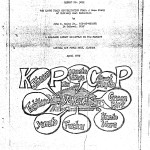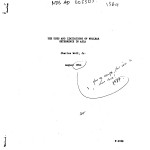- DETERRENCE: Collected thoughts on Phil Karber
- DPRK: Space is common wealth: KCNA white paper
- CLIMATE CHANGE ADAPTATION: Decision making in a changing climate: Adaptation challenges and choices, World Resources Report 2010-2011
- ENERGY SECURITY: As coal use declines in U.S., coal companies focus on China
- GOVERNANCE AND CIVIL SOCIETY: South Korean President Lee orders tougher measures against Chinese fishing after stabbing
Archives
Policy Forum 11-42: Japan’s Nuclear Village Wages War on Renewable Energy and the Feed-in Tariff
Andrew DeWit, a Professor of the Political Economy of Public Finance at the School of Policy Studies, Rikkyo University and an Asia-Pacific Journal Coordinator, discusses how Japan’s powerful nuclear village is struggling to regain control of the nation’s feed-in tariff (FIT) after a legislative bill passed August 26, 2011 shifted control of the pricing structure of the FIT from the nuclear-sympathetic Ministry of Trade Economy to a newly formed committee publicly tasked with expanding investment in renewable energies.
Read a response to this article here.
The Kanto Plain Consolidation Plan: A Case Study of Military Cost Reduction

The study describes the political and economic conditions that impacted the U.S. Air Force basing posture in Tokyo, Japan in early 1970 and the plan that was developed to reduce these impacts. The main theme explains the formulation and successful implementation of this plan that was designed to preserve mission capability at reduced cost by consolidating widely scattered activities away from metropolitan Tokyo by fiscal year 1975. John G. McKay writes, “Perhaps this case study of a successful USAF plan and program will serve some useful purpose in future U.S. force posturing in that it records the methodology employed for achieving a significant cost-savings through dedicated and perserving efforts in effective resource management.”
This report was released to the Nautilus Institute under the US Freedom of Information Act (FOIA). See the Institute’s FOIA Global Disclosure Project page to read more chronologies, histories and reports released to Nautilus.
Policy Forum 11-41: A Code of Conduct for the South China Sea: What Should It Contain?
Mark Valencia, Nautilus Institute Associate and NARP Research Associate, explores options for the upcoming ASEAN and China negotiations concerning a Code of Conduct (CoC) to govern activities in the South China Sea. There are hopes that a Code can be presented and approved at the ASEAN-China 2012 summit, but the key elements have yet to be decided. Valencia contends that the CoC must include an agreement as to 1) where, to whom, and to what the Code applies, 2) how it addresses non-state actors and Taiwan, and 3) the scope of the Code—which should broad, and address resource exploration and exploitation, marine scientific research, and military activities.
NAPSNet 08 December 2011
- DETERRENCE: The nuclear matters handbook
- DPRK: Experimental LWR construction: FM spokesman
- CLIMATE CHANGE ADAPTATION: Foresight international dimensions of climate change
- ENERGY SECURITY: Toward a sustainable future for the U.S. power sector: Beyond business as usual 2011
- GOVERNANCE AND CIVIL SOCIETY: Aid effectiveness: “The unbearable lightness of the Busan Declaration”
- AUSTRAL SECURITY: Spy expert warns of Beijing tie to satellite
The Uses and Limitations of Nuclear Deterrence in Asia

In this 1964 report Wolf explores US extended nuclear deterrence in China, Japan, and South Korea as well as the impact it could have in Asian countries then “under Communist threat”. Wolf uses two frameworks to assess the effectiveness of US conventional military and nuclear options in Asia: “broad-deterrence” and “narrow-deterrence” options. Wolf uses these two views to consider the provocation threshold, military and political pressures and alternative actions at play in each situation. Wolf writes, “In Asia, we are left with a wide range of current and potential undeterred conflicts. Although nuclear deterrence is more operative and effective than is often believed, its limitations are manifest not only in the Vietnamese and Laos cases, but in the unambiguous Indonesian confrontation with Malaysia and in the case of various forms of possible Chinese aggression against India or Burma. It is in this area of undeterred conflicts where our greatest need for improvements in programs and policies lie.”
This report was released to the Nautilus Institute under the US Freedom of Information Act (FOIA). See the Institute’s FOIA Global Disclosure Project page to read more chronologies, histories and reports released to Nautilus.
NAPSNet 1 December 2011
- DETERRENCE: The amateur strategist, intuitive deterrence theories and the politics of the nuclear arms race
- DPRK: Anthracite export to China suspended temporarily
- CLIMATE CHANGE ADAPTATION: Converging and conflicting interests in adaptation to environmental change in central Vietnam
- ENERGY SECURITY: Small reactors planned for Zhangzhou
- GOVERNANCE AND CIVIL SOCIETY: Osaka voters reject status quo of Japan’s main parties
- AUSTRAL SECURITY: China reproaches Australia over strengthened US defence ties
South Korea’s Plans for Tidal Power: When a “Green” Solution Creates More Problems
Yekang Ko, a Ph.D. candidate in Environmental Planning at UC Berkeley, and Derek K. Schubert, a Landscape Architect at John Northmore Roberts & Associates and President of SAVE International, respond to “Case Study of Green Economy Policies: Korea” by Sun-Jin Yun and Myungrae Cho (Nautilus Institute Special Report, September 13, 2011). Yun and Cho argue that the center of South Korea’s Green Growth clearly favors economic growth, national industrial competitiveness, and an energy portfolio emphasizing nuclear power, but puts little effort toward promoting energy democracy and justice for decentralized renewable energy systems and local communities. As a complementary study to Yun and Cho’s report, the authors introduce a fierce controversy between large-scale tidal power and the local efforts toward preserving wetlands and fisheries in Incheon, South Korea.
Policy Forum 11-40: The 2012 Nuclear Security Summit: Opportunities and Challenges
Duyeon Kim, Deputy Director of Non-Proliferation at the Center for Arms Control and Non-Proliferation, writes, “There are clear ways in which Seoul can capitalize on its strengths to flavor the 2012 [Nuclear Security Summit] with a “Korean twist” as it maintains depth on key substantive issues that ensure the security of nuclear materials, parts, and facilities…The challenge lies in clearly demonstrating that the benefits outweigh the costs, and that states would have a national interest in further investing their political capital in nuclear security.”
NAPSNet 22 November 2011
- DETERRENCE: Anti-nuclear Rudd urged US to keep arsenal for deterrence
- CLIMATE CHANGE ADAPTION: Sustainable adaptation: An oxymoron?
- DPRK: S. Korea to give NK natural gas plant for pipeline: Source
- ENERGY SECURITY: Evaluating energy security performance from 1990 to 2010 for eighteen countries
- GOVERNANCE AND CIVIL SOCIETY: S. Korea, China, Japan reaffirm commitment to resolving NK nuclear standoff
- AUSTRAL SECURITY: 2500 US marines on Australian soil to increase defence ties

